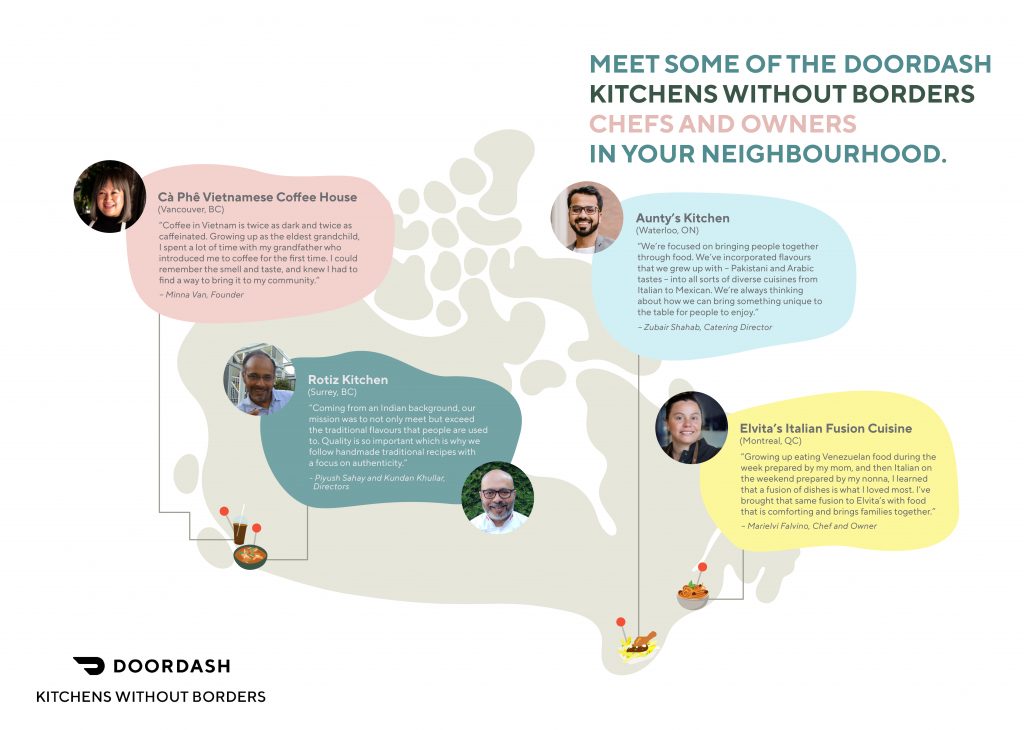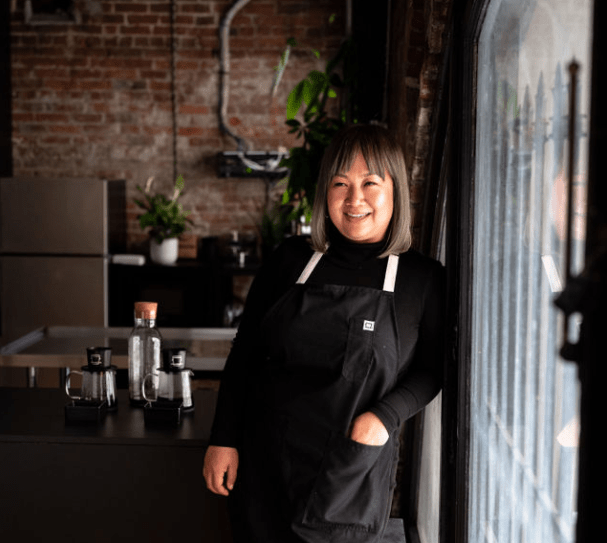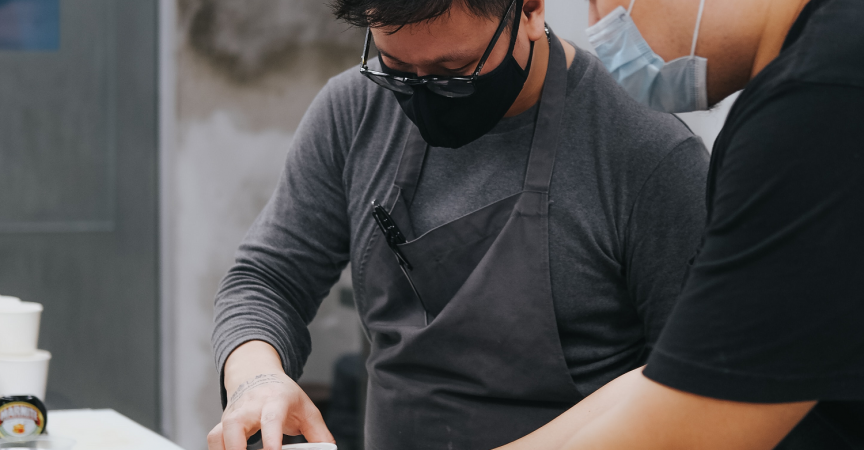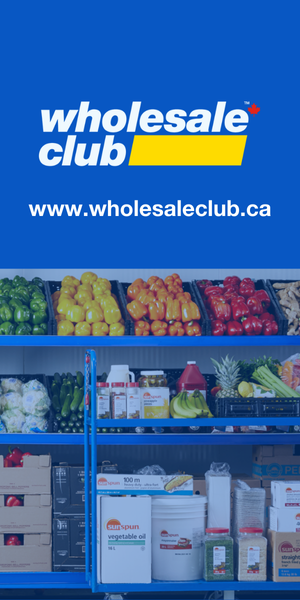Kitchens Without Borders: Supporting local and immigrant-owned restaurants
It goes without saying that the support of local restaurants is essential at this time. Restaurants Canada has recently launched SupportRestaurants.ca as part of the #RestaurantsAreFamily initiative. The website invites consumers and the industry alike to pledge their support for local restaurants in their community by dining-in (where applicable), getting takeout, purchasing gift cards, or ordering delivery. Delivery has been a lifeline to restaurants during COVID-19. As the industry tries to keep up and manage changing guidelines, and rolling restrictions, delivery has been a staple throughout the pandemic.
DoorDash has committed to ensuring the support of local restaurants with their program, Kitchens Without Borders, newly launched in Canada. This program supports immigrant-owned businesses while also raising awareness of the critical role these entrepreneurs play in our local economies and culinary landscape.
Kitchens Without Borders is an extension of DoorDash’s mission to grow
and empower local economies, celebrating immigrant-owned restaurants who embody
what it means to be Canadian, and honoring cultural diversity through food.

DoorDash Kitchens Without Borders works with immigrant and refugee-owned restaurants to help consumers find, purchase from, and support these local businesses during these turbulent times. The program also supplies participants with valuable small business coaching.
We spoke to two Canadian entrepreneurs taking part in DoorDash Kitchens Without Borders to learn about their experience with the program and how it’s helping to assist them during the pandemic.
Minna Van, Cà Phê Vietnamese Coffee House, Vancouver, British Columbia

Tell us about yourself!
I was born in Vietnam and arrived in Canada in the 90s. I ended up in the foodservice industry purely accidentally. Prior to owning a restaurant, I worked in tech, in programming at a coworking space. The coworking space had room for a cafe and I had just returned from a trip to Vietnam and I had brought back Vietnamese coffee. I decided to open up a little pop up in the space and it took off!
What is it about Vietnamese coffee that resonated with you?
Just like the country of Vietnam, their coffee is resilient. I thought the story of Vietnamese coffee was so compelling and I wanted to bring that back to Canada. The coffee introduced in Vietnam was a French robust style, and I wanted to introduce that to British Columbia in an elevated way. Introduced in Vietnam by the French, the adoption of Vietnamese coffee is an example of cultural appropriation for survival. It’s like picking out the good part of colonial history.
Can you briefly describe your establishment?
Vietnamese food is often seen as being cheap and fast. And Vietnamese coffee an afterthought. However, the cuisine is sophisticated and thoughtful and is a blend of cultures – a fusion of French colonialism and Chinese domination. I wanted to show how the cuisine can be elevated and I wanted the coffee to slow you down, and really let it be highlighted.
Can you go through the operational changes you’ve experienced since March?
In January, we closed our Chinatown location and relocated to downtown Vancouver. Just as we were set to reopen, the pandemic hit. We made the decision to close down for a week before reopening only to offer delivery. From March to June, we operated only with delivery; it really saved our business. People were hesitant to come in person and our business was located around offices, and with everyone working from home, delivery is the main way we reach our customers. Pre-COVID, our business offered catering but we’ve pivoted to offer lunch delivery and have adjusted our menu accordingly.
Tell us about your team and operations.
We made the conscious decision to have an all-female staff of all newcomers. My priority is to support women. The world would be a better place if women were supported. Our operation doesn’t take tips and we pay a living wage as well as health care benefits. As an immigrant myself, I know those language barriers can be an issue for newcomers so we really try to simplify operations in order to integrate and incorporate staff who don’t share the same language. We use the universal language of pictures in the kitchen with visual instructions to teach employees.
How did you get involved in Kitchens Without Borders?
I received an email from DoorDash letting me know about the program and applied. I thought it was important to be a part of this initiative because we have a story to tell consumers. I think there’s an influx of people supporting local, immigrant-owned businesses and this is so important at this time. We give proceeds from our operations to educational and community-focused programs. When you invest in your neighbourhood restaurants, that money gets reinvested into the community. COVID-19 has shown us what a local ecosystem looks like, and what it looks like disrupted.
Can you speak a little about your experience with Kitchens Without Borders?
When the pandemic first hit, there was a lot of Asian-focused racism which was incredibly disheartening to hear of and see. In joining Kitchens Without Borders it’s been uplifting to see people intentionally support immigrant-run businesses.
What type of message would you provide to consumers so they understand the importance of supporting local?
I would tell consumers that when they support restaurants, they support more than just that one business. They’re supporting a miller, a farmer, a bakery, a cannery and they’re contributing to food security for the community.
Zubair Shahab, Aunty’s Kitchen, Waterloo & Mississauga, Ontario

Tell us about yourself!
I was born in Pakistan but raised in Kuwait before immigrating to Canada. I’ve always been entrepreneurial-minded and in university, I decided to open a restaurant, though I didn’t study foodservice. However, my mother is an amazing cook and we grew up around incredible food. My brother was studying at Waterloo University and we noticed a gap in the market for affordable, high-quality food for students. Our business partner was a chef and they would handle food and we would handle the business side.
Can you briefly describe your establishment?
I think Aunty’s Kitchen is constantly evolving. Our first iteration was in Waterloo but it was a basic location. We renovated it for a more modern look. The goal was to serve both authentic Pakistani and ‘not-so-much authentic’ food but it is a more modern space. Our second location is in Mississauga. We wanted our establishments to have a homey feeling but reflect the lively Pakistani culture. We have large, colorful murals painted to reflect ‘truck art’ of Pakistan. Our menu really reflects the blend of cultures that I grew up with – from Pakistan to Kuwait to Canada. When I arrived in Canada 15 years ago my favourite meal was poutine and now that’s reflected in our Butter Chicken Poutine dish.
What was the consumer reception to your business?
What we do is pretty unique; for example, we have Spicy Chicken Naan (similar to a pizza on a naan) and Butter Chicken Poutine. Consumers were pretty receptive to this fusion mix but it does differ generationally. I think a lot of younger generations can really relate to this meld of cultures because that’s how they grew up as well.
Can you go through the operational changes you’ve experienced since March?
Our establishments don’t have a patio, so takeout and delivery were essential to our operations. We’ve always offered delivery but it became even more important from March onwards. Like the rest of the industry, we’ve noticed that trends have accelerated due to COVID-19. Things like delivery were always a focus, but now it’s much bigger.
What is the value of the Kitchens Without Borders program for your business?
The mentorship program has provided the most benefit to my business. They connected me with a mentor in Minneapolis and we have weekly meetings. Like I mentioned, I didn’t study culinary arts or foodservice and I was kind of thrown into the restaurant world. We try to mentor our own staff, so we absorb whatever we can through online programs, others in the industry, or through the mentorship program and pass that on to our employees.
Additionally, I think Kitchens Without Borders has played a big role in introducing consumers to new foods. Canadians are really open to trying new foods and this program has helped expose our restaurant, making more people aware of it.
Were you able to take your past life studying engineering and apply it to your career as a restaurateur?
I’m very science-oriented and that made its way into the business. In order to grow as a business, and to have multiple locations, we needed to ensure consistent flavour, and excellent customer service. We know that traditional cooking methods impacted the flavour of food but how can grow and replicate that taste across multiple locations with different staff and ensure quick delivery? Using my science background came in handy here as we explored different technology, equipment, and methods of cooking to help propel the business forward.
How have you been able to weave in traditional or authentic cooking techniques or ingredients?
We import spices to keep food authentic. We don’t really have the expertise for authentic cooking techniques but we’ve come up with different ways of working around that, relying on new tech and equipment. The result is that we can increase quality and produce an incredible product. For example, traditional cooking methods may use charcoal or bbqs but that just isn’t feasible for us. Instead, we use a Japanese-designed grill. It’s incredible how we can be inspired even from countries as far away as Japan while cooking Pakistan-Canadian fusion.
Can you speak to the importance of supporting local?
Canadians excel at supporting local. I think they recognize that small business carries a lot of weight and they want to support. On our end, we also feel the need to contribute to the community. When the pandemic hit, we were struggling but we also recognized that frontline workers were risking their lives and we wanted to give them free meals. We announced that frontline workers could come in and claim a free meal. We were happy to be able to assist the neighbourhood at this time and in return, we’ve felt immense support from our local community.
How can food play a part in preserving culture?
Food keeps an identity to the culture. In Pakistan, the food is culture. Social events revolve around eating and it’s how families gather and interact. Rice dishes are shared amongst a family, we have a culture of sitting together with family and sharing. Family values are a major part of the culture in the east and that comes out through the food.










Greetings from Imbeke Development Centre. We are a village based community development organization in western Kenya, Homabay County. We work with community groups, and have a special focus on vulnerable girls and teen age mothers, towards their self sustainability by offering them skills training among other support.
These are girls/ teen age mothers, school drop outs, who we have harnessed from forced child labor, forced early marriages, gender violence, forced sex work, and such other vices.Through support, we are establishing a vocational skills training center in the village, to enable them to train and gain skills to earn decent living for themselves, and a temporary Safe House to help accommodate them with their babies.
We seek your support to enable our centre link with your organization for support in acquiring equipment for the Cookery Class, and if possible to send your volunteers when able to assist in training.
Regards
Sophie Redemptah Otieno
Director